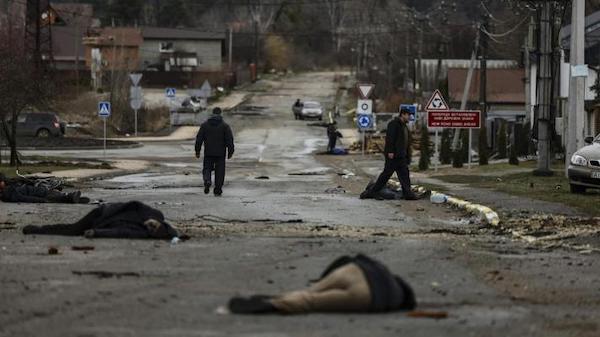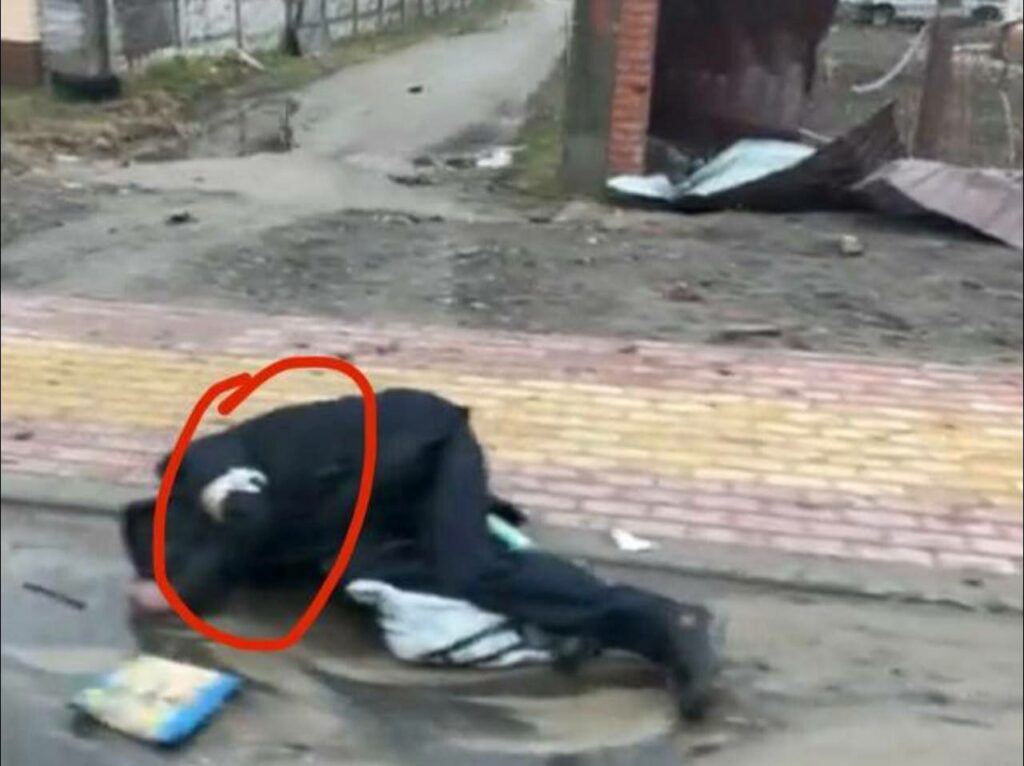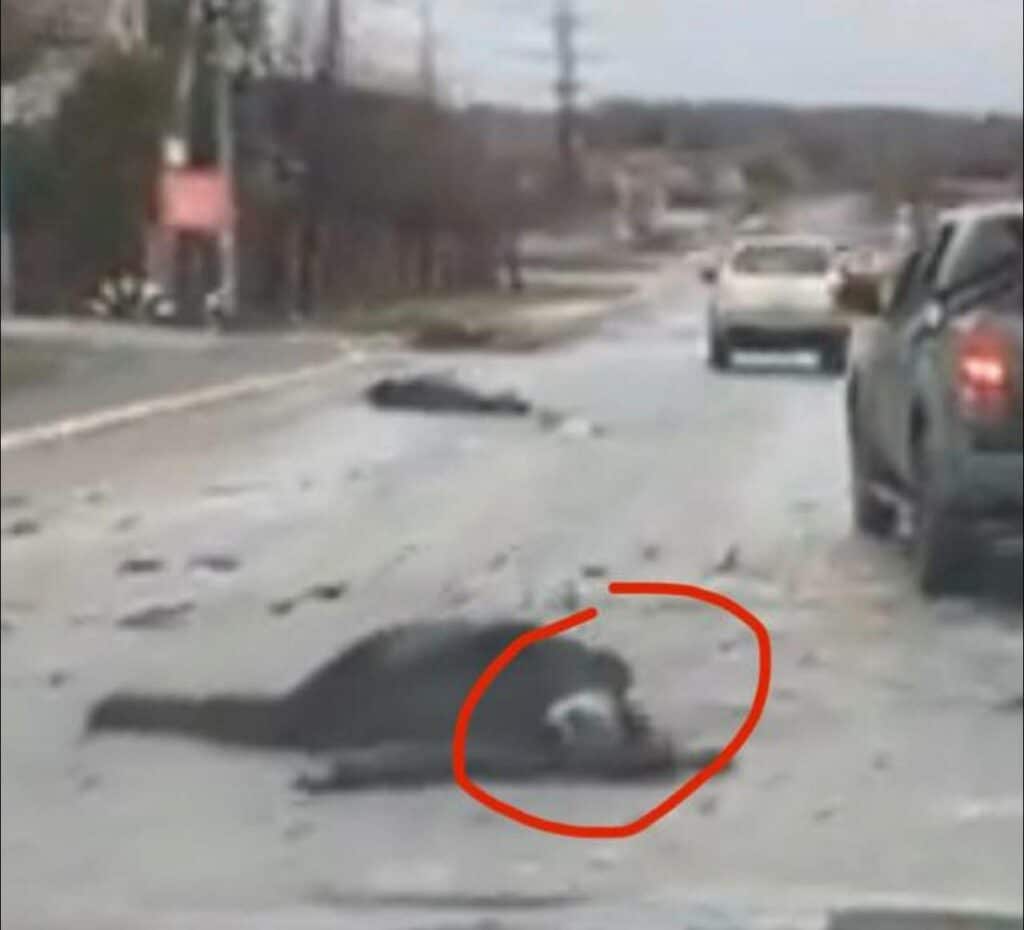The city of Bucha, in Ukraine, has recently come to the attention of the U.S. and EU corporate media, for the purpose of criminalizing Russia for the supposed assassination of 300 civilians. However, the lack of evidence for these claims brings into doubt any allegations that the Russian military was involved.
After the Ukronazi regime of Volodimir Zelensky published images depicting corpses in Bucha, supposedly killed by the Russian military, in the middle of the street and in mass graves, calls have been issued for Russia to be tried internationally for war crimes.
Reuters correspondents confirmed that they had seen bodies strewn in the streets, with their hands and feet tied, as if they had been arrested.
The Ukrainian Minister of Foreign Relations Dmytro Kuleba posted a series of tweets in English with the images, and requests for the G7 countries to roll out even more “sanctions” against the Russian Federation. He called the scene a premeditated “massacre” carried out by the Kremlin and pleaded for more international military aid. “Tanks, combat aircraft, heavy air defense systems. Provide them now,” wrote Kuleba.
Sergei Lavrov, Russia’s minister of foreign affairs, has responded that “another attack of false claims was made in the city of Bucha, in the Kiev region, after the Russian military had already left the area, as was planned and agreed upon. A few days later, they organized a staged event there which the Ukrainian spokespeople and their western sponsors have been disseminating throughout TV channels and social media.”
Additionally the minister of defense released a statement in which he rejected Kiev’s accusations:
All of the photos and videos published by the Kiev regime which supposedly show the “crimes” committed by the Russian military in the city of Bucha, in the Kiev region, are a novel provocation… While this city was under the control of the Russian Armed Forces, not a single local resident was subject to violent actions. The Russian military delivered 452 tons of humanitarian aid to civilians in the Kiev region… During the entire period that the city was controlled by the Russian Armed Forces and even after, the local residents could freely move through the city of Bucha and use their cell phones… The exits from Bucha were not blocked off. All of the local residents had the opportunity to freely leave the city to the north, even towards Bielorrusia. At the same time, the south of the city, even the residential areas in the outskirts of the city, were bombarded for 24 hours by the Ukrainian troops with heavy artillery, tanks and various missiles… We want to stress that the Russian military left Bucha on the 30 of March, a day after the peace negotiations which took place between Russia and Ukraine in Turkey… Furthermore, on the 31 of March, the Mayor himself [of Bucha], Anatoli Fedoruk, confirmed in a video that the Russian military was no longer there and did not mention that any local residents had been arrested and shot in the street… Thus, it is no surprise that all of this so-called “evidence of crimes” in Bucha has appeared four days later, when the Ukrainian Security Service and the Ukranian TV representatives had arrived to the city… The fact that none of the bodies in the images published by Kiev were suffering from rigor mortis is especially worrisome, they lacked the pale complexion characteristic of a corpse and were not covered in coagulated blood… All of this is irrefutable proof that the photos and videos published from Bucha were produced by the Kiev regime for the western media, just like the maternity hospital from Mariupol.
In this regard, the Russian version starkly contrasts with the Ukronazi version of events, which has so aptly been spread by the western media in a new chapter of the information war against Russia. Russia’s government not only rejected the claims of the Ukrainian president, but also affirms that the massacre was “staged” and is a “provocation.”
As the Zelensky government requests that the Kremlin be judged by the International Criminal Court for war crimes, the United Kingdom has contested Russia’s calls for a new session to be held at the United Nations Security Council in order to discuss the subject, which is surprising since this would be the ideal place to put forward the demands of Ukraine’s Foreign Minister.
When the events are carefully analyzed, it becomes apparent that the Russians are much closer to the truth that the Ukrainian regime.
Proof that the Ukronazi’s staged the events
The Russian military was present in Bucha, which is almost 40 kilometers outside of the capital, for approximately five weeks while it was positioned around Kiev, .
The website War On Fakes, which has taken up the task of deconstructing the biggest lies, fake news, and psychological operations which have been promoted in relation to the Ukrainian battleground, has posted a chronology from March 30 to the present in order to determine if the Kiev regime’s accusations have any substance:
- Russian troops leave Bucha on March 30. Here is the official declaration.
- On March 31, the mayor of Bucha, Anatoly Fedoruk, posted a video declaring with a happy smile on his face that “March 31 will go down in the history of our settlement and the entire territorial community as the day of liberation from Russian orcs, Russian occupiers of our settlements, by our Armed Forces of Ukraine.”
- War On Fakes put forth the following questions: “Would Fedoruk be so happy if dozens of his people were lying dead on the street? Why didn’t he say anything about the ‘atrocities of the Russian executioners’? About the torture, rape and murder?”
- The media campaign, initiated this Sunday, April 3, was launched four days after the Russian Military had left Bucha. During this period, there was not a single report bearing similarity to Ukraine’s accusations.
- The New York Times reported that between April 1 and 2, remnants of the neo-Nazi Azov battalion, which forms part of the Ukrainian military, entered the city of Bucha.
- On April 2, the Ukrainian police published a news report on Bucha. There were no claims of a massacre or of corpses. There were no bodies in the recording and photos.
- “Moreover, the first unit of the Ukrainian armed forces to enter Bucha was the special forces of the National Guard of Ukraine,” added War On Fakes. “The official telegram channel of the National Guard posted a video, filmed by the fighters of this detachment themselves. We can see on this video that the Ukrainian military calmly pass through the streets of the city—and no ‘mountains of corpses’ are visible on these streets.”
- After seeing the videos one would have to ask themselves: “So where did the corpses on the streets of Bucha come from. And who are these people?”
- To which War On Fakes responds: “The answer may lie in the video of the territorial defense of Ukraine, which clearly states the question ‘Can I shoot at them if there are no blue armbands?’ To which a positive response follows. The video was originally posted by the leader of the territorial defense Sergey ‘Botsman’ Korotkikh.”
- The video can be found here, due to the fact that Botsman deleted it from his account.
- The Telegram Channel Intel Slava Z, which has been following the Russian military operation with great detail from the beginning, has shown that in the cities in which there was a Russian military presence, civilians wore a white arm band as a sign of their non-military status, indicating that they were not directly involved in the conflict. In videos, civilians in Mariupol can be seen with the white arm band, as the city was recently freed from the neo-Nazi Azov Battalion.
- “By the way, on the videos distributed by the Ukrainian side, almost all the corpses have white bandages,” wrote War On Fakes. “This is a distinctive sign of the Ministry of Defense of the Russian Federation and the civilian population.”
Intel Slava Z has also pointed out how the corpses lying on Bucha’s streets are next to supply rations which the Russians were providing to the Ukrainian population as humanitarian aid. The channel went on to comment that “the Armed Forced of Ukraine shot people regardless of whether they were armed or not. The main thing is that they were wearing white arm bands, which means they were not enemy soldiers. International journalists, open your eyes. It wasn’t the Russian troops who crushed the civilians in Bucha, it was the neo-Nazi regime that you have been supporting.”
- War On Fakes concluded by saying that “Katerina Ukraintseva, a member of the Bucha City Council and a volunteer for the defense, admitted in an interview with Meduza that Russian troops did not shoot people in her presence. In the same interview, she confirms that the Ukrainian military is to blame for the main destruction: ‘If the Armed Forces of Ukraine had responded to the Russian army with all firepower, the city would have been completely destroyed.’”
As Misión Verdad has frequently reported, it has been the Ukrainian troops and the neo-Nazi paramilitaries who have taken up arms against the civilian population, using them as a human shield against the Russian military offensive.
Reports that the Ukrainian forces have assassinated civilians who have received Russian humanitarian aid, or who have been accused of treason, are not being shared by the western media (except on rare occasions, as can be seen in the following video). Western media is wholeheartedly attempting to whitewash the crimes repeatedly committed by the Ukrainian neo-Nazi regime.
A few conclusions can be drawn from these events, conclusions which go beyond the specifics of these particular events:
- The reports from Bucha are an attempt to derail the peace negotiations taking place between Russia and Ukraine. According to The Times, the United Kingdom seeks to delay the signing of an agreement between the two nations. Again, Boris Johnson’s government refuses to convene at the United Nations Security Council on the question of Bucha.
- With the staging of a “new Sbrebrenica,” as it was referred to by the Ukrainian Minister of Defense, the media and the spokespeople who corroborate his version of events are whitewashing the Nazi regime in Kiev, following the path of US psychological operations, which are an attempt to augment support for NATO protection.
- Rolling out even more sanctions against Russia is another objective with geopolitical implications. After hearing about Ukraine’s version of the Bucha events, French President Emmanuel Macron has stated that he is in favor a new round of offensive economic steps against Russia, especially against the coal and oil sectors.
With all of the facts on the table, it is up to the reader to extract their own conclusions. Of course, an international commission led by qualified experts would have to investigate these events in order to determine the actual dimensions of what happened at Bucha. However, the operation seems to have had the desired effect in the West.
Translation: Orinoco Tribune



